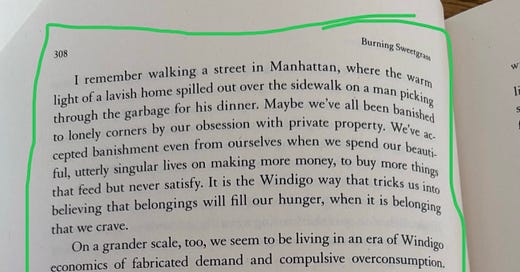I’d like to state a series of assumptions that I believe many of us, including myself, hold:
Buying things is our birthright, is a sign of a good economy
Buying things solves problems
Replacing last year‘s model with this year‘s model is appropriate and makes sense
If something is cheap enough, you might as well just buy it
While I think about these assumptions on a surface level often, lately I’ve been thinking about how deep they run, and how deep they run me.
Growing up in a capitalist culture, we are not taught to challenge any of these assumptions because they make sense in the world around us. Many of these assumptions are just the water we swim in, the air we breathe. We are not forced to look at them often if ever.
All of the tariff chaos certainly has many of us thinking about all the stuff we buy from other countries and therefore it has us thinking about all the stuff we buy, period. Thinking about the cheap crap I buy on Amazon and wondering if it will become twice as expensive as a result of the tariffs naturally leads me to think about buying the crap in the first place.
I have been reading an epic book, Braiding Sweetgrass, by Robin Wall Kimmerer, which maybe many of you have already read. It’s about the intersection of botany (the study of plants) and indigenous practices and traditions related to plants and land. I bought it a year ago and started reading it, but didn’t make it very far. I guess I wasn’t quite ready for it. I picked it back up a few weeks ago and I’m ready for it now. It’s one of those books that makes you wonder if you should have or should be leading a different life, which is always a bit uncomfortable for me, but I think the stretch into slight discomfort is a really healthy way to course correct where you are and where you’re trying to go. For example, in my extreme imagination, it makes me wonder if I should be homesteading on my own piece of land, but the immediate and more now-friendly effect is to inspire me to work in my garden this spring and stay really connected to the plants that I want to cultivate around my home.
The author shares wonderful specific examples of different tribes, different plants and and how their stories intersect. She also shares some broader commentary on how we live now, and the passage below is what inspired me on this topic for this newsletter. She is talking about an evil spirit, Windigo, that, to paraphrase, feeds on our more selfish and self-serving instincts. She ties Windigo directly to consumption, which I found fascinating. Read below:
I relate to so much of this- this never ending quest for more money and more things, better money, better things, but rarely can we buy happiness. I use the word rarely to reserve the right to say that good food, especially gelato, does, in fact, buy happiness.
Tariffs…. Let’s meander for a moment
Regarding the tariffs, in case you’re curious for another perspective, while I take issue with a lot about how the tariffs are being proposed and thrown around, one silver lining that I hope will come to fruition through the tariffs is that people will start to look at the stuff they already own and they will look at the stuff that already exists locally that they could buy secondhand or have repaired. Things that already exist, especially regionally, are likely to start to feel more affordable and findable than things we have been ordering from China and other countries facing steep tariffs. This real-time real-life example from resale technology marketplace Back Market was served up to me on a silver platter so please enjoy exactly what I’m talking about from the Circular Connect newsletter:
Back Market CEO sees Trump’s tariffs as a catalyst for changing consumer habits. Higher prices on new products will drive consumers towards the secondary market and change perspectives on buying new. Back Market already witnessed this first hand, with sales of their products tripling in the wake of tariff announcements. Read more.
Another silver lining brought to my attention recently is a potential reversal of a major disruption stemming from decades of products leaving the US to be made in China and other nearby countries. I was speaking with a long-time domestic textile operator who has lost (over decades) a whole segment of their business to cheap polyester replacements coming from China. The polyester, Chinese version of their product had become cheaper than the domestic product, and everyone switched to the Chinese product, a very common story. With the looming tariff threats, this domestic business owner is going back to all of their previous clients who had switched to the Chinese product, who are now afraid that the Chinese product will quickly become too expensive, and possibly more expensive than the domestic product. It is possible and likely that many of these previous clients will become clients once again of a US made product.
That’s it for this week- as always, what do you think? Feel free to reply directly to this email to share your opinions with me.
Cynthia




